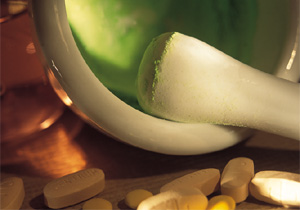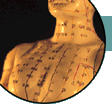Differentiating Syndromes of the Heart
Syndromes of heart qi zu and heart yang xu
Palpitation and shortness of breath aggravated by exertion, spontaneous sweating, thready and weak pulse, and regular pulse or irregular intermittent pulse, are the basic symptoms of heart qi deficiency (xu) and heat yang deficiency (xu). If the above symptoms are accompanied with a pale and lusterless complexion, lassitude and a pale tongue proper with whitish coating, they are in the category of heart qi deficiency. If they are complicated with chills, cold extremities, fullness of the chest, pallor, and a pale or dark purplish tongue proper, they are considered as syndromes of the heart yang deficiency.
If heart qi or heart yang is insufficient, then the blood circulation is not promoted and shortness of breath aggravated by exertion will manifest. If heart yang is inadequate to restrict heart fluid, there will be spontaneous sweating. Qi deficiency leads to blood deficiency and weakness of yang qi, so disorders of blood circulation will manifest by thready, weak, irregular or regular intermittent pulses. Heart qi deficiency, or the failure of yang qi and blood to nourish the tongue, face and body, causes a pale and lusterless complexion, pale tongue proper, and lassitude. Heart yang deficiency fails to warm the limbs, which causes chills and cold extremities. Failure of yang qi in the chest causes the improper circulation of qi and blood, manifesting a fullness in the chest and a dark purplish tongue proper.
Syndromes of heart blood deficiency and heart yin deficiency
Palpitation, insomnia, dream disturbed sleep and poor memory. If these symptoms are accompanied with a lusterless complexion, dizziness, pale tongue and lips, and a thready pulse, then these are heart blood deficiency syndromes. If the symptoms are complicated with irritability, thirst, feverish sensation of the palms and soles, tidal fever, night sweating, dry red tongue proper, and a thready rapid pulse, then these are heart yin deficiency syndromes.
The heart dominates the blood and its vessels, so heart blood deficiency and heart yin deficiency both cause malnourishment of the head region, manifesting as malnourishment of the mind, producing symptoms of palpitation, poor memory, insomnia, and dreamed disturbed sleep; malnourishment of the facial region, producing symptoms of lusterless complexion, pale tongue and lips; malnourishment of the brain, manifesting as dizziness and a thready weak pulse. Heart yin insufficiency also leads to heart yang preponderance and internal xu fire disturbances which cause irritability, feverish sensation of the palms, dry red tongue proper with scanty fluid, and thready rapid pulse.
Syndromes of heart fire preponderance
Ulcers of the tongue and mouth, anxiety, insomnia, thirst, yellowish urine, a red tongue tip, and rapid pulse.
The heart opens to the tongue. If there is a preponderance of heart fire, it flares up to attack the tongue causing ulceration. If heart fire causes internal disturbances, it first affects the mind, causing irritability and insomnia. A preponderance of hear fire consumes the body fluids, causing thirst, red tongue tip, and rapid pulse.
Stagnation of heart blood syndromes
Palpitation, paroxysmal pricking pain, or stuffy pain of the precardiac region referring to the shoulder and arm of the left side, cyanosis of the lips and nails, cold extremities, spontaneous sweating, dark red tongue proper, or purplish tongue proper with petechiae, thready rugged pulse, or regular and irregular intermittent pulse.
Obstruction of heart yang leads to unsmooth circulation of qi and blood, and the stagnation of blood in the vessels, causing palpitation and cardiac pain. The small intestine channel of the hand Taiyang is exterior and interior related to the hear channel, so the qi of the two channels affect each other, that is why cardiac pain is related to the shoulder and arm. The stagnation of heart blood may also bring on cyanosis of the lips and nails, dark red tongue proper, or purplish tongue proper with petechiae, thready rugged pulse, or regular and irregular intermittent pulse. Heart blood stagnation blocks the yang qi from spreading over the body surface and the four extremities, so cold extremities and spontaneous sweating result.
Phlegm fire heart-disturbing syndrome
Mental disorder, weeping and laughing without apparent reason (emotional liability), mania, redness of face, thirst, coarse breath, yellowish urine, yellow and sticky tongue coating, slippery, rapid, and forceful pulse.
Phlegm-fire disturbs the heart mind and exhausts the body fluid, so the above symptoms and pulses appear.
Related Subjects
Read more on description of the main syndromes of other zang-fu organs:
Liver,
Spleen,
Lung,
Kidney,
Small Intestine,
Large Intestine,
Urinary Bladder,
Stomach, and
Gall Bladder.
|

 This website is published, edited and designed by Raymond Cheng,
and reflects only and only his personal views and opinions in his individual capacity.
The information available at this website is not intended
directly or by implication to either diagnose or treat any
medical, emotional, or psychological condition or disorder.
It is also not intended to create a physician-patient relationship
between you and I or between you and Wyith Institute™ and The Office of Dr Raymond K K Cheng.
The information here is not a substitute for advice and treatment provided
by your physician or by another healthcare professional.
It is always recommended that consultation with local healthcare providers
be obtained for any of your specific health or medical concerns.
Furthermore, any products that can be purchased (yet you can see I don't have much
to sell here) through advertisers' banners or through links to other websites
are not either explicitly or implicitly given any warranty or endorsement
by me, my colleagues, Wyith Institute™ or any of its associated businesses.
This website is published, edited and designed by Raymond Cheng,
and reflects only and only his personal views and opinions in his individual capacity.
The information available at this website is not intended
directly or by implication to either diagnose or treat any
medical, emotional, or psychological condition or disorder.
It is also not intended to create a physician-patient relationship
between you and I or between you and Wyith Institute™ and The Office of Dr Raymond K K Cheng.
The information here is not a substitute for advice and treatment provided
by your physician or by another healthcare professional.
It is always recommended that consultation with local healthcare providers
be obtained for any of your specific health or medical concerns.
Furthermore, any products that can be purchased (yet you can see I don't have much
to sell here) through advertisers' banners or through links to other websites
are not either explicitly or implicitly given any warranty or endorsement
by me, my colleagues, Wyith Institute™ or any of its associated businesses.



 Thank you for visiting this TCM and acupuncture information website.
If you have previously been to this website, you might have
noticed that some of the pages on ancient historical ideas and
holistic thinkings related to Chinese metaphysics are temporarily taken offline.
This is because I will be revamping the whole website and be moving
those information into a new \"Ancient Chinese Culture\" section
so as to reflect a more current perspective on the interpretation
of some of the fundamental concepts as well as to include
some of the latest information in the area.
But if you have just found this website for the very first time, I welcome you again and
wish you could find what you require and, hopefully, you could also be benefitted
from reading the articles I published on this website.
Thank you for visiting this TCM and acupuncture information website.
If you have previously been to this website, you might have
noticed that some of the pages on ancient historical ideas and
holistic thinkings related to Chinese metaphysics are temporarily taken offline.
This is because I will be revamping the whole website and be moving
those information into a new \"Ancient Chinese Culture\" section
so as to reflect a more current perspective on the interpretation
of some of the fundamental concepts as well as to include
some of the latest information in the area.
But if you have just found this website for the very first time, I welcome you again and
wish you could find what you require and, hopefully, you could also be benefitted
from reading the articles I published on this website.